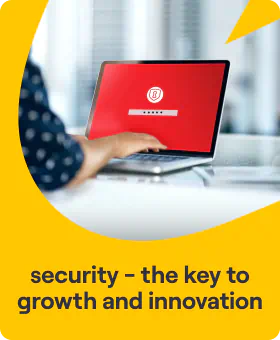frequently searched on Vi
Published on 20th July, 2023
Published by Vi Business
In today's fast-paced digital era, where organisations rely heavily on cloud computing, automation, and a workforce driven by digital technologies, a new set of complexities has emerged.
While digital transformation brings unprecedented opportunities, it also exposes businesses, particularly MSMEs, to heightened cybersecurity risks.
As more MSMEs migrate to the cloud or accelerate their cloud adoption to streamline operations and improve efficiency, the vulnerabilities in their cloud defences become increasingly apparent.
Cybersecurity - Challenges for MSME
The rapid growth of cloud technologies has revolutionised the way businesses operate, enabling enhanced collaboration, scalability, and cost efficiency. However, alongside these advancements, the spectre of cyber breaches and attacks looms large.
In fact, Indian companies have witnessed a 53% rise in cyberattacks over the previous year. The total monetary loss encountered stood at $2.32 Mn for 1.39 Mn incidents. This shows that the challenge of cybersecurity is big.
Threat actors have evolved their tactics to exploit the gaps and weaknesses inherent in cloud environments, targeting valuable data, intellectual property, and financial assets. This escalating menace calls for a comprehensive understanding of the challenges that MSMEs face in safeguarding their digital assets.
One of the key factors amplifying the vulnerability of MSMEs is the swift transition to the cloud. With workloads moving away from traditional infrastructure and onto cloud platforms, businesses face the risk of securing their data and applications across a vast and dynamic digital landscape.
The very agility and accessibility that make the cloud attractive also create potential entry points for cybercriminals. As a result, organisations must address the pressing issue of cloud security with utmost urgency and meticulous planning.
Opportunities for MSMEs to Protect from Attacks
In the face of limited resources and expertise, MSMEs can find opportunities to safeguard their digital assets from cyberattacks.
The best approach to this is outsourcing security operations.
By outsourcing security and partnering with specialised security companies, MSMEs can leverage the following advantages:
- Access to Expertise and Tools: Outsourcing security provides MSMEs with access to specialised knowledge, cutting-edge tools, and technologies necessary for robust cybersecurity.
- Cost-Effectiveness and Scalability: Engaging external security services allows MSMEs to benefit from cost-effective solutions that can scale as their businesses grow without the burden of significant financial investments.
- 24/7 Monitoring and Incident Response: Security service providers offer continuous monitoring and proactive threat detection, ensuring potential attacks are swiftly identified and mitigated. They also provide a rapid incident response to minimise the impact of security breaches.
- Compliance and Regulatory Assistance: Security companies assist MSMEs in navigating industry-specific regulations and compliance requirements, ensuring adherence and enhancing overall security posture.
- Focus on Core Competencies: By entrusting security needs to external experts, MSMEs can free up internal resources to concentrate on core competencies, innovation, growth, and building competitive advantages. In the era of digitalisation, yet another aspect to keep in mind is that not everything needs to be built. You can have a partner of choice, and you don't have to excel in every area of business.
Addressing Specific Needs in the Cloud-Hyperconnected World
Prioritise People-centric Security
Recognise that people are often the weakest link in security and prioritise efforts to educate and train employees about cybersecurity best practices.
MSMEs should foster a culture of security awareness, emphasizing the importance of strong passwords, phishing awareness, and safe online behaviour. Implement regular training sessions and establish clear security policies to mitigate human-related security risks.
Secure Data Flows and API Connections
Given the interconnected nature of MSMEs, it is crucial to focus on securing data flows and API connections with partner organisations. Implement robust authentication and access controls to ensure that only authorised entities can access sensitive data.
MSMEs should employ encryption techniques to protect data in transit and at rest and regularly assess the security posture of API modules to identify and address vulnerabilities promptly.
Prioritise Data Residency and Application Security
Be mindful of where your data resides and ensure proper controls are in place to protect it. Consider data encryption, secure storage solutions, and access controls to prevent unauthorised access to sensitive information. Regularly review and update security measures to keep pace with evolving threats.
Additionally, focus on securing your applications by following secure coding practices, performing code reviews, and implementing application-level security measures to prevent breaches and unauthorised access.
Choose the Right Security Partner
It is important from a data breach and security perspective that the applications of advanced technologies like AI we're witnessing in the news have been previously available. So, it's widely important that when you choose the right partner, ensure that they're on top of such situations.
So, when selecting a security partner, MSMEs should prioritise their expertise in addressing the specific challenges and risks of the cloud-hyperconnected world. Ensure that they have a deep understanding of the latest security threats and technologies, including AI-based applications.
Evaluate their track record in handling data breaches and their ability to proactively respond to emerging security incidents. Choose a partner who stays ahead of the curve and continuously improves their security practices to safeguard your MSME's digital assets.
At Vi Business, we help MSMEs protect themselves from modern security threats. We surveyed more than 1,00,000 MSMEs across industries. MSMEs adopting security products have high digital maturity, averaging between 60-65%. MSMEs who are yet to adopt any kind of security solution have around 25% less digital maturity than the ones who have built security into their digital roadmap.
Know more about how Vi Business can help your business adopt security solutions and improve your digital maturity: https://www.myvi.in/business/security-solutions
MSMEs are the driving force of the Indian economy. At Vi Business, we believe in equipping them with the right digital tools and technology to thrive in today’s business world.
Our ReadyForNext assessment helps MSMEs gain insights into their digital readiness and access India’s largest MSME study.
go to top
dedicated support system

